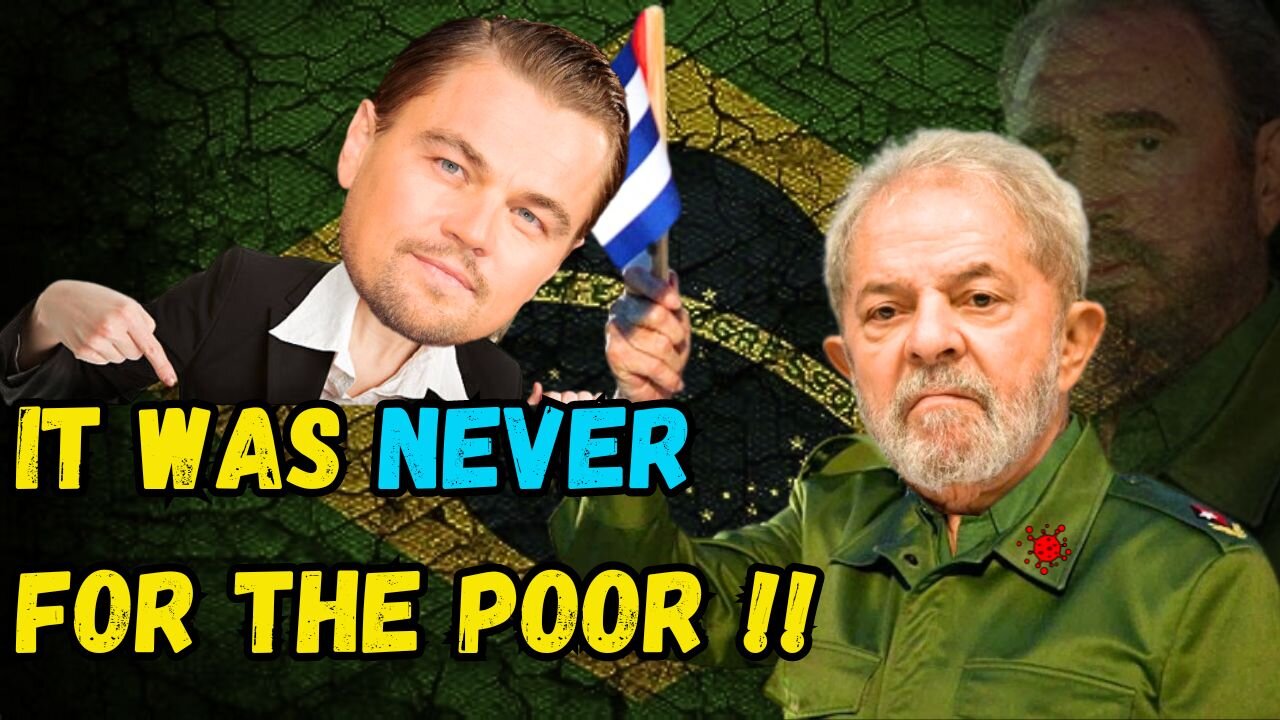Premium Only Content

Lula's words are a warning to the entire Brazilian people about his true intentions.
Political Narratives in Brazil
The scorching sun reflected its blistering heat on the sidewalks of any city in Brazil. Conversations on street corners and in bars were boiling, just like the passion of a people who, for decades, have witnessed the spectacle of national politics. Tempers flared, and divergent opinions echoed through the streets like dissonant symphonies. It was a moment to reflect on what seemed to be a constant in Brazilian politics: the relentless pursuit of power and the fear of its perpetuation by the left.
President Lula, an iconic and controversial figure in Brazilian politics, had uttered words that resonated with many. "When you want to stage a coup, you construct a narrative," he said. It was hard to disagree with this statement, regardless of one's political bias. After all, the history of the Workers' Party is filled with examples where the manipulation of truth was used to consolidate or maintain power.
Lula was right in highlighting how the construction of a false narrative can be the foundation for dangerous and unethical actions. Creating an alternative reality in people's minds, where lies become truth, is a powerful tactic that has been used in various contexts by the authoritarian regimes that President Lula admires so much. Unfortunately, Brazil is no exception to this reality.
Looking at Brazil's recent political history, it is undeniable that the Workers' Party (PT) has been building narratives throughout its journey. It cannot be denied that under PT rule, there were setbacks, but there were also corruption scandals that tarnished its image. Brazil witnessed a growing polarization between those who saw the party as a defender of social rights and those who accused it of rampant corruption.
It's no wonder that Lula's figure was the subject of intense debates, both inside and outside the country. Political polarization reached worrying levels, with accusations of narrative manipulation, the spread of misinformation, and Lula's dark intentions of dominating institutions out of sheer greed.
It's important to remember that the pursuit of power is not an exclusive characteristic of the left or the right. It is inherent in politics, and all political sides have their strategists and manipulators. However, the central question is how the Brazilian people can discern between the legitimate pursuit of a political agenda and the manipulation of narratives in pursuit of power perpetuation.
The real challenge is to cultivate an informed and critical society capable of objectively analyzing political speeches, questioning sources of information, and resisting the temptation to accept convenient truths without scrutiny. Democracy is strengthened when its citizens can distinguish between empty rhetoric and concrete proposals.
At this moment when Brazil finds itself, it is important that the population is vigilant and committed to healthy political debate. Social media can be both a battleground for misinformation and a tool for awareness. It is the responsibility of all of us to use them wisely.
Lula's words serve as a warning to the entire Brazilian people about his true intentions. They remind us of the importance of being critical, questioning political narratives, and being aware of how the manipulation of truth can be used as a dangerous weapon. Politics is a mirror of society, and it is the role of every Brazilian citizen to shape the country's future based on solid democratic values and a commitment to truth, regardless of where it may lead us.
-
 2:54:07
2:54:07
The Robert Scott Bell Show
18 hours agoRFK Shifts CDC Focus, Dr. Sabine Hazan, Ellen Tart-Jensen, Iridology, Catharine Arnston, Algae Health - The RSB Show 9-3-25
4892 -
 2:45:31
2:45:31
daniellesmithab
1 day agoAlberta Next: Medicine Hat Town Hall
2.45K -
 3:40:01
3:40:01
FreshandFit
8 hours agoEngaged Chick Gets EXPOSED For Having OF
62.7K106 -
 18:54
18:54
GritsGG
14 hours agoIs This SMG the New #1 Close Range Option on Warzone?
7.4K3 -
 2:13:09
2:13:09
Side Scrollers Podcast
19 hours agoDruski/White Face Controversy + Women “Experience Guilt” Gaming + More | Side Scrollers Live
47K5 -
 16:02
16:02
The Pascal Show
15 hours ago $0.37 earned'HE WAS FAKE CRYING!' Witness Says Jake Haro BEGGED FOR HELP Finding Emmanuel Thru Fake Tears
8.52K1 -
 2:21:10
2:21:10
Badlands Media
12 hours agoDevolution Power Hour Ep. 386: Epstein Disclosures, Clinton Foundation, and Trump’s Wartime Authority
206K22 -
 2:07:22
2:07:22
Inverted World Live
12 hours agoGiant Asteroid Skims Past Earth Today | Ep. 102
55.9K10 -
 3:11:00
3:11:00
TimcastIRL
10 hours agoTrump Kills 11 Narco Terrorists, Democrats Warn War With Venezuela Coming | Timcast IRL
195K216 -
 13:07
13:07
Robbi On The Record
3 days ago $6.57 earnedSweet Poison: The Big Fat Lie That’s Killing America
58.9K27